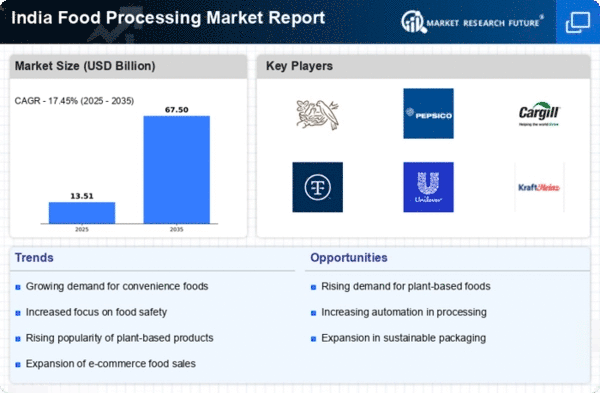Rising Urbanization
The rapid urbanization in India is a pivotal driver for the food processing market. As urban populations grow, there is an increasing demand for processed food products that are convenient and ready-to-eat. Urban consumers often seek products that save time and effort in meal preparation. According to recent data, urban areas are projected to account for over 50% of India's population by 2030, leading to a substantial increase in demand for processed foods. This shift in consumer behavior is likely to encourage food processing companies to innovate and diversify their product offerings to cater to urban lifestyles. The food processing market is thus expected to expand significantly, driven by the need for convenience and variety in food options.
Changing Consumer Preferences
The evolving preferences of Indian consumers significantly influence the food processing market. There is a noticeable shift towards convenience foods, organic products, and ready-to-eat meals, driven by busy lifestyles and a growing awareness of health and nutrition. Market data indicates that the demand for organic processed foods is expected to grow at a CAGR of 15% over the next five years. This trend compels food processing companies to adapt their product lines to meet these changing preferences. As consumers increasingly prioritize quality and health, the food processing market must innovate to provide products that align with these values, ensuring sustained growth and competitiveness.
Government Initiatives and Support
Government initiatives aimed at boosting the food processing market play a crucial role in its growth. The Indian government has introduced various schemes to enhance food processing infrastructure, such as the Pradhan Mantri Kisan Sampada Yojana, which aims to create modern food processing facilities. These initiatives are designed to increase the value addition of agricultural products, thereby enhancing farmers' incomes. Furthermore, the government has set a target to increase the food processing sector's contribution to the agricultural GDP from 10% to 25% by 2025. Such supportive measures are likely to attract investments and foster innovation within the food processing market, ultimately leading to a more robust industry.
Increased Investment in Infrastructure
Investment in food processing infrastructure is a critical driver for the market's expansion in India. The establishment of food parks, cold storage facilities, and logistics networks is essential for reducing post-harvest losses and ensuring the efficient distribution of processed foods. Recent reports suggest that the Indian food processing market is expected to attract investments exceeding $33 billion by 2025, reflecting a growing recognition of the sector's potential. Enhanced infrastructure not only supports the growth of food processing companies but also facilitates better access to markets for farmers, thereby creating a more integrated food supply chain. This investment trend is likely to bolster the food processing market, fostering innovation and competitiveness.
Technological Innovations in Processing
Technological advancements in food processing techniques are transforming the industry landscape in India. Innovations such as high-pressure processing, vacuum packaging, and automation are enhancing product quality and shelf life while reducing waste. The adoption of these technologies is expected to increase efficiency and lower production costs, making processed foods more accessible to consumers. Furthermore, the integration of digital technologies, such as IoT and AI, is likely to optimize supply chain management and improve food safety standards. As these technologies become more prevalent, the food processing market is poised for significant growth, driven by enhanced operational capabilities and improved product offerings.
















